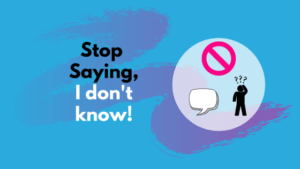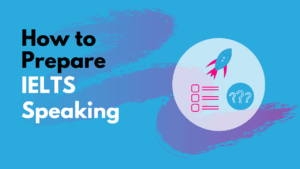Many students are confused about the IELTS Speaking introduction questions in part 1 of the test.
How should you introduce yourself in IELTS Speaking?
Should I give long, fancy answers or keep it short and simple?
How can I be culturally appropriate?
Trust me, it’s not the complicated.
So, let’s find out.
I will show you vey simply how to introduce yourself in IELTS speaking part 1, including giving your name, talking about your home, hometown, work or studies.
I also want to give you some tips and tricks about making this part of the test work for you.
Table of Contents
What happens in the IELTS Speaking Introduction?
Well, after you arrive at the test centre and register, you usually have to leave your belongings in a special room and go to the waiting area.
The examiner will invite you into the room.
They will be recording the whole test, so don’t be surprised to see an MP3 player on the table.
How to give your name
The examiner asks for your name and checks your ID.
Keep it simple
Examiner: What’s your name?
Candidate: Keith Michael O’Hare
Examiner: and what can I call you?
Candidate: Just call me Keith
Or
Candidate: You can call me Keith
Tips and Tricks
1. Get to the test centre a little early
2. Listen to some English (on your phone) before the test.
This will help you get in the mood.
3. Get mentally prepared.
If you are nervous, that is normal and fine. Just allow your nerves to be. Some nerves or butterflies before the test are a good thing. Smile. Be proud of your English. Love your English. Stay in that positive mood for a few seconds.
4. Ignore any notes the examiner makes.
Examiners may make notes and they are usually the timings they follow. They are not your score and have nothing to do with you. Ignore them.
How many parts are there in Part 1?
- The examiner asks your name
- The examiner will ask 1 or 2 questions about one of the following
Hometown
Home
Work
Study
- You will be asked 2 to 3 questions on two more part 1 topics.
Get more information about part 1 topics and questions here.
Tips and Tricks
5. Keep your answer short and sweet.
Two to three sentences is enough.
The first IELTS Speaking introduction questions are really a warm up. The examiner is not really evaluating you very much, they are just getting used to your voice.
However, first impressions are important.
If you make lots of grammar mistakes, they will notice.
It will be like a tomato stain on your shirt!
So keep your answers simple, so you can be really accurate and with our mistakes.
How to talk about your hometown
You can talk about where you were born or about where you live now. It doesn’t matter which one.
The important thing is you are talking about a town (or village) that you know well and is important to you.
Here are some simple templates you could practice.
Examiner: Tell me about the town where you live
You: I live in _______
I’ve been living here / there for ______ years
It’s a _______ city / village with __________
Examiner: What’s the most interesting part of that place?
You: The most interesting part for me, is probably ______
Examiner: What kind of jobs do people do there?
You: A variety of jobs I think
There are a lot of ______(fishermen)
________(fishing) is major source of income for the city.
A number of people
also work in the ________ (tourism) sector.
Tips and Tricks
6. Don’t write out your answers
Many students write out their answers, like this.
There are several beaches that attract many tourists. I like to go to these beaches most weekends for a swim or a paddle. Sometimes, I just go for a stroll on the sand.
Then, they try to improve them, something like this,
There are several beautiful beaches that attract a myriad of tourists. I like to go to these scenic spots most weekends for a swim or a paddle. Sometimes, I just go for a stroll on the soft, golden sand.
Looks good, right?
No!
It looks like written English.
And when you recite it, you will sound like a book!
This is not the way to practice.
When you see a question you want to practice, speak out the answer.
If you want to write it out, you can but don’t use full, tidy sentences. That is not how we talk. We don’t talk in sentences, we talk in sound chunks.
So, if you must write out your answer, write it in chunks or phrases, like natural spoken English.
Remember, IELTS Speaking is a test of natural English, not written English.
So, your answer would look better like this
There are several beaches
that attract a lot of tourists
and I like to go to one of them
well, most weekends
maybe for a swim or a paddle
or just a stroll on the sand
How to talk about your home or accommodation
Here you will want to learn the basic vocabulary to describe homes and flats. Remember to learn collocations, such as,
a detached house
a townhouse
a cosy bungalow
a spacious flat
a comfy apartment
a high-rise building
Here are some templates you could practice with
Examiner: Do you live in a house or a flat? / What kind of accommodation do you live in?
You: I live in _______ (flat)
in the ___________ (suburbs) of the city
It’s not too big, not too small
but it’s _______ (nice) and _________ (cosy)
Examiner: Who do you live with?
You: I live with _________ (my wife)
we’ve been living together for _______ (2 years)
OR
You: I live with _________ (my parents)
I’ve always lived with them actually.
OR
You: I live on my own
I’ve been living by myself since _______ (I left home)
OR
You: I share a house actually with _________ (some friends)
we’ve been living together for _______ ( 5 months)
Tips and Tricks
7. Repeat the question.
Sometimes it is a good idea to repeat the question, so you can buy time to think. This is also a very natural way of speaking.
Examiner: What is your favourite room?
You: What’s my favourite room? Erm, let me see. Yes, I think my favourite room is my bedroom.
Examiner: How is your home decorated? / What is your favourite room?
Here you can talk about furniture (sofas, chairs, tables), photos and paintings (on tables, hanging on the walls), as well as adornments (candles, figurines, plants, min-statues)
Examiner: Do you like living there?
You: Yes, I do.
I really like it actually because it’s __________
(spacious) and _________ (cosy)
There are plenty of _________ (shops) and
_________ (restaurants) nearby
It’s well connected.
How to talk about your work
Here, the examiner will give a signpost (tell you the topic) and ask you a simple question.
Make you answer very simple.
Examiner: Let’s talk about what you do, do you work or are you a student?
You: I am a student
I’m studying ________ (history) in ___________ (London University)
OR
You: I work
and I am a ___________ (teacher) in ____________ (London School)
Tips and Tricks
8. Avoid lists
When they ask you, ‘what you do everyday?’, don’t just give a list of things – like a shopping list!
Choose just 2 things, and give some small details.
This will allow you to show a wider range of vocabulary.
Examiner : What do you do everyday?
You:
I teach, I give classes online
So I have to prepare my classes
I usually do some research for that
And on top of that
I have to write reports for my students
Examiner: What would you like to change about your job?
Notice, this is not about changing you job, but about which parts of your job you don’t like and would like to change or not do.
The following template is a good one to practice,
Examiner: What would you like to change about your job?
You: Well, I am not a big fan of ________ (writing reports).
If I could,
I would change that.
It’d be good to __________(let someone else do that)
Examiner: Can you describe your work environment?
Here you can talk about some of the following,
- your work place,
- the room,
- the furniture
- the facilities (air conditioning, canteen, computers, games room…)
- the people (colleagues, bosses, peers…)
- the atmosphere (tense, formal, relaxed, laid back, informal…)
Examiner: Can you describe your work environment?
You: I work in an open plan office
There are about 20 of us
the facilities are pretty good
you know we have state of the art computers
the atmosphere’s pretty relaxed
How to talk about your studies
The examiner may ask what you study, but if you have already said that, they will most likely move onto the next question.
There are possible many questions, (see some possible questions here) but let’s look at this one, and some possible answers
Examiner: Why did you choose that subject?
You: To be honest,
my parents chose it for me
OR
Examiner: Why did you choose that subject?
You: To be honest,
I chose it because
I have always been interested in __________
I was inspired by_______
So, ever since then, I’ve wanted to be a __________
If the examiner asks whether you like it, you can say which part you like and why, or which part you don’t like and why.
Examiner: Do you like it?
You: Absolutely, it’s great.
I particularly like_______
because____________
OR
You: Yes, overall I do like it
But I am not so fond of___________
because_________
That’s it, you are now ready to answer the IELTS Speaking introduction questions.
Remember to use the templates to practice, but do not memorise answers by heart.
You need to sound as natural as possible.
The secret is in the practice.
Why not start practicing on italki today?
Click the button below to start.





29 thoughts on “IELTS Speaking: How to Introduce Yourself”
Pingback: IELTS Speaking: How to Introduce Yourself - Tips and Tricks | Driving Tips
I am very interesting to improve my English language as well.
I am sree pada das. I am really a fan of your speaking class. I want to study more.please help me.
Hi, thanks for following me. You can study more for free with the live lessons here: https://keithspeakingacademy.com/ielts-speaking-free-live-lessons/
If you want to follow a course with me, you can find more details here: https://courses.keithspeakingacademy.com/p/ielts-speaking-get-band-7-gold
Dear Keith,
I hope this message finds you well. I am writing to you to ask about your online course. I really wanted to get your online courses but we can not pay for them in Iran. Do you have any solution for students inside Iran? I am sure many Iranians follow your excellent training, so maybe you have faced this issue before.
Thank you so much.
Best Regards,
Naeime
Thanks – I am afraid at the moment, I don’t have a solution for this. Hopefully, we can find one in the future!
Pingback: IELTS Speaking: How to Introduce Yourself – Tips and Tricks | Tips For Effective Conversations
The best tips and tricks ever. Thank you very much Keith. You made all the lessons simple and get us full insight.
My pleasure
Is elts and aptist test similar?
Pingback: IELTS Speaking: How to Introduce Yourself - Tips and Tricks - IndoXanh
I love ur way of teaching. It is very helpful for me. Thanku sir.
Glad you like it!
My husband and i i fell in love with you, what to do? 😀
but honestly, at the moment i have no idea about talking from the bottom of my heart with Examiner 😛
>”Remember to use the templates to practice, but do not memories answers by heart.”<
That’s lovely…and with the examiner, well, talk ‘naturally’, but it doesn’t have to be an intimate conversation. Relax and enjoy it. Love back to you both!
Pingback: IELTS Speaking: How to Introduce Yourself - Tips and Tricks – XanhBlue Share for All
Is there a way to print out the tips and tricks?
Not at the moment, but it is a good suggestion for me. I will see if I can work on it in future.
Perfect explanation 👍
Thank you so much!
Preparing for my ielts in February came across your lessons I must say your the best teacher ever, thanks so much for your teaching it’s helping me a lot
Thank you so much Louise!
Thanks sir, very good content and very well explained.
Highly appreciated!!
So glad you like it!
Hello,
I would like improve my Ielts results .. can you please help me .. how to subscribe to your lessons
Hi
I would like to improve my English language and become more confident .so, I hope if I can get your 1-1 speaking course and how I can participate on it ?
Thanks for the comment Wishes, I am afraid at the moment I cannot take on new students due to too many work commitments.
You could try looking for a teacher on italki – https://go.italki.com/IELTS
I love your classes. They are really helping me a lot.
So pleased to hear that!